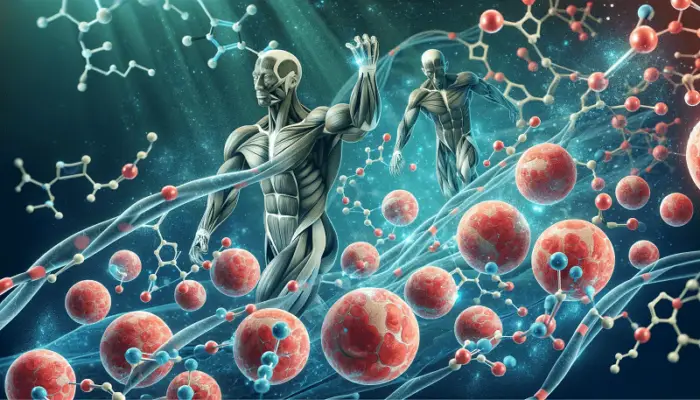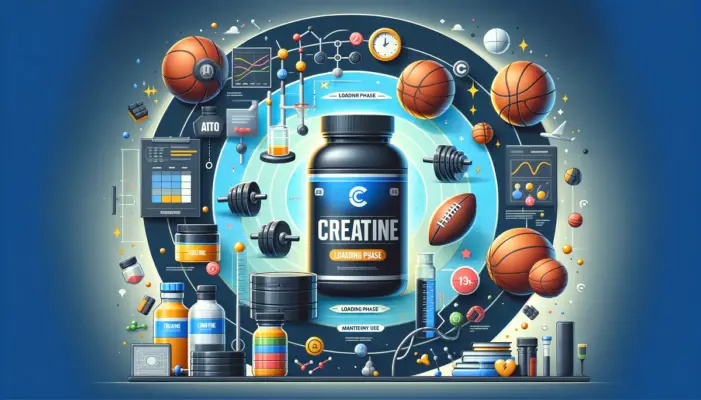Basketball enthusiasts and fitness buffs alike often wonder about the secrets behind the incredible athleticism of NBA players. One question that frequently pops up is: “Do NBA players take creatine?”
This article aims to provide a comprehensive look at this topic, covering everything from the basics of creatine to its application in the high-stakes world of professional basketball.
1. Introduction: The Intersection of Creatine and Professional Basketball
Unraveling the Role of Supplements in Elite Sports
In the competitive realm of professional basketball, every marginal gain counts. This is where sports nutrition, particularly supplements like creatine, come into play. Creatine, a naturally occurring compound, has gained significant attention in the sports world for its potential to enhance athletic performance.
Why Focus on Creatine?
- Widely Researched: Creatine is one of the most extensively studied sports supplements.
- Performance Enhancement: Known for its role in improving high-intensity athletic performance.
- Popularity in Sports: Widely used in various sports for its perceived benefits.
In this article, we delve into the intricacies of creatine use, specifically in the context of NBA players. We aim to provide a balanced perspective, combining scientific insights with real-world applications in professional basketball.
2. Understanding Creatine: What It Is and How It Works
The Science Behind This Popular Supplement
Before diving into its use in the NBA, it’s essential to understand what creatine is and how it functions in the body.
What is Creatine? Creatine naturally occurs in muscle cells. This compound aids in energy generation within muscles during intense workouts or substantial lifting. While the body produces creatine naturally, it can also be obtained through certain foods and supplements.
How Does Creatine Work?
- Energy Production: Creatine contributes to the production of adenosine triphosphate (ATP), the primary energy carrier in the body. This is particularly crucial during short, intense bursts of activity – a common aspect of basketball.
- Muscle Mass and Strength: Studies suggest that creatine can increase muscle mass, strength, and exercise performance.
- Cognitive Benefits: Emerging research indicates potential cognitive enhancements, particularly under stress or sleep deprivation.
Creatine’s Role in Sports Performance:
- Enhanced Muscle Endurance: By increasing ATP production, creatine can enhance the ability to perform high-intensity exercises.
- Improved Recovery: Creatine may reduce muscle cell damage and inflammation following exhaustive exercise, promoting quicker recovery.
In the next sections, we’ll explore how these properties of creatine align with the demands of professional basketball and whether NBA players incorporate this supplement into their regimen.

3. Creatine in the NBA: Usage and Regulations
When it comes to NBA players and their supplement use, it’s crucial to understand the league’s stance and the players’ approach to creatine.
NBA’s Stance on Supplements:
- Not Prohibited: The NBA does not specifically ban creatine, allowing players to use it as part of their nutritional regimen.
- Guidance on Usage: Players are advised to use supplements that are NSF Certified for Sport® to ensure they don’t inadvertently consume banned substances.
How Players Might Use Creatine:
- Performance Enhancement: Given its benefits in improving high-intensity performance and recovery, creatine is a logical choice for many players.
- Individualized Usage: Players, often with the guidance of nutritionists, may use creatine in ways that best suit their training and recovery needs.
It’s important to note that while creatine is widely accepted, the specifics of its use among individual NBA players are often private, given the competitive nature of the sport.
4. The Benefits of Creatine for Basketball Players
Boosting Performance on the Court
The physical demands of basketball make it a prime candidate for the benefits offered by creatine supplementation.
Key Benefits for Basketball Players:
- Increased Power and Strength: Basketball requires explosive power for jumping, sprinting, and quick directional changes. Creatine can enhance these aspects of performance.
- Improved Endurance: The ability to maintain intensity throughout the game can be critical, especially during the final quarters.
Supporting Studies:
- Research in sports science consistently shows that creatine can improve high-intensity exercise capacity and muscle mass.
- Studies specifically focusing on basketball players have noted improvements in shooting precision and reduced fatigue.
5. Creatine Supplementation: Dosage and Best Practices
Optimizing Creatine Intake for Athletic Performance
Understanding the optimal way to supplement with creatine can make a significant difference in its effectiveness.
Recommended Dosage:
- The standard protocol involves a loading phase of 20 grams per day (divided into four servings) for 5-7 days, followed by a maintenance dose of 3-5 grams per day.
- Some opt for a no-loading approach, taking 3-5 grams daily, which can still yield benefits but may take longer to see results.
Best Practices for NBA Players:
- Timing: Some players prefer taking creatine pre-workout for increased energy, while others take it post-workout for recovery.
- Combination with Other Nutrients: Creatine absorption can be enhanced when taken with carbohydrates and protein.
- Hydration: Adequate water intake is essential when supplementing with creatine to facilitate its uptake and reduce any potential renal strain.
In the next sections, we’ll explore potential side effects and hear from NBA players and experts about their experiences with creatine.

6. Potential Side Effects and Misconceptions About Creatine
Weighing the Risks and Clarifying Myths
While creatine is generally safe and widely used, it’s important to address potential side effects and common misconceptions.
Possible Side Effects:
- Water Retention Concern: The use of creatine may result in the body retaining water, which could temporarily increase body weight.
- Digestive Issues: High doses might lead to stomach discomfort in some individuals.
- Kidney Stress: There’s a misconception that creatine harms the kidneys; however, for healthy individuals, there’s little evidence to support this.
Debunking Myths:
- Performance-Enhancing Drugs: Creatine is sometimes mistakenly categorized with banned performance-enhancing drugs. It’s a legal and widely accepted supplement in sports.
- Effectiveness: Some believe creatine only benefits certain sports, but research shows its benefits across various high-intensity activities, including basketball.
Understanding these aspects helps athletes, including NBA players, make informed decisions about creatine use, ensuring safety and effectiveness.
7. Conclusion: Creatine in NBA – An Invaluable Tool for Athletes
Final Thoughts on Creatine’s Role in Professional Basketball
To conclude, creatine stands out as a potentially invaluable tool for NBA players. It offers a range of benefits suited to the high-intensity nature of basketball, from improving power and endurance to aiding in recovery.
Summary:
- Widely Used and Accepted: While individual usage may vary, creatine is a popular supplement in the NBA and other sports due to its significant benefits.
- Safe and Effective: With proper usage and under guidance, creatine is a safe supplement that can enhance athletic performance.
- Personalization is Key: Each player’s approach to creatine use should be tailored to their specific needs and goals.
In the ever-evolving world of sports nutrition, creatine remains a staple in many athletes’ regimens, and its role in professional basketball is a testament to its efficacy.
Whether you’re an aspiring athlete or a fan, understanding how supplements like creatine are used in high-level sports can provide valuable insights into the pursuit of peak performance.






